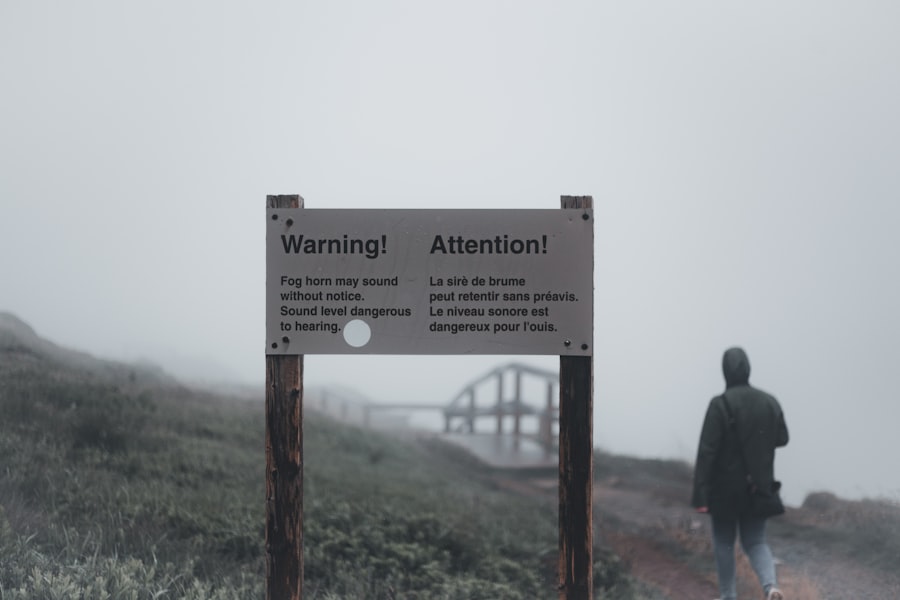In today’s digital age, social media has become an integral part of your daily life. You may find yourself scrolling through feeds, liking posts, and sharing updates without even realizing how much time you spend online. This constant engagement can lead to a phenomenon known as social media brain fog.
Essentially, this term describes the mental fatigue and confusion that can arise from excessive social media use. You might feel overwhelmed by the sheer volume of information, opinions, and images that flood your screen, leading to a sense of disconnection from reality and difficulty concentrating on tasks. Social media brain fog can manifest in various ways.
You may notice that your attention span has diminished, making it challenging to focus on work or engage in meaningful conversations. The endless stream of notifications can create a sense of urgency, pulling you away from the present moment and leaving you feeling mentally drained. Understanding this phenomenon is the first step toward reclaiming your mental clarity and well-being.
By recognizing how social media impacts your cognitive functions, you can take proactive measures to mitigate its effects and foster a healthier relationship with technology.
Key Takeaways
- Social media brain fog is a real phenomenon that can affect mental clarity and focus.
- Symptoms of social media brain fog include decreased attention span, increased stress, and feelings of comparison and inadequacy.
- Setting boundaries with social media, such as limiting usage and curating your feed, can help alleviate symptoms.
- Unplugging and taking breaks from social media, as well as engaging in mindfulness practices, can improve mental well-being.
- Prioritizing real-life connections and seeking professional help if needed are important steps in managing social media brain fog.
Recognizing the Symptoms
To effectively combat social media brain fog, it’s crucial to recognize its symptoms. You might find yourself feeling easily distracted, struggling to concentrate on tasks that once seemed straightforward. Perhaps you experience a sense of anxiety or restlessness when you’re away from your devices, constantly checking for updates or notifications.
These feelings can be exacerbated by the pressure to stay connected and informed, leading to a cycle of compulsive scrolling that further clouds your mind. Another symptom to watch for is emotional fatigue. You may feel drained after spending time on social media, as the constant barrage of information can be overwhelming.
This emotional toll can manifest as irritability or mood swings, making it difficult to engage with others in a meaningful way. By identifying these symptoms early on, you can take steps to address them before they escalate into more significant issues. Awareness is key; once you recognize how social media affects your mental state, you can begin to implement strategies to regain control over your cognitive health.
Setting Boundaries with Social Media

Establishing boundaries with social media is essential for maintaining your mental well-being. You might start by designating specific times during the day for checking your accounts, rather than allowing notifications to dictate your schedule. By creating a structured approach to social media use, you can minimize distractions and focus on more important tasks.
Consider setting aside certain hours as “social media-free” zones, allowing yourself to engage in activities that promote mental clarity and relaxation.
You may find that certain accounts or groups contribute to feelings of anxiety or negativity.
By unfollowing or muting these sources, you can curate a more positive online experience that aligns with your values and interests. Setting boundaries isn’t just about limiting time spent online; it’s also about ensuring that your social media interactions are enriching rather than depleting.
Unplugging and Taking Breaks
| Metrics | Results |
|---|---|
| Productivity | Increase |
| Stress Levels | Decrease |
| Work-Life Balance | Improvement |
| Creativity | Enhancement |
Taking regular breaks from social media is vital for combating brain fog and restoring mental clarity. You might consider implementing “digital detox” days where you completely unplug from all devices. This intentional disconnection allows you to reconnect with yourself and the world around you without the constant influence of social media.
During these breaks, you can engage in activities that nourish your mind and spirit, such as reading a book, going for a walk, or spending quality time with loved ones. Even short breaks throughout the day can be beneficial. You could set a timer for every hour of work or study to remind yourself to step away from screens for a few minutes.
Use this time to stretch, breathe deeply, or simply enjoy the silence. These small pauses can help clear your mind and improve your focus when you return to your tasks. By prioritizing breaks, you create a healthier balance between online engagement and real-life experiences.
Engaging in Mindfulness Practices
Incorporating mindfulness practices into your daily routine can significantly enhance your ability to manage social media brain fog. Mindfulness encourages you to be present in the moment, fostering a deeper connection with your thoughts and feelings. You might start by dedicating just a few minutes each day to mindfulness exercises such as meditation or deep breathing.
These practices can help ground you and reduce feelings of anxiety associated with constant online engagement. You could also explore mindful consumption of social media by approaching it with intention. Before logging in, take a moment to set an intention for your time online—whether it’s to connect with friends, seek inspiration, or simply enjoy some lighthearted content.
By being intentional about your social media use, you cultivate a more mindful approach that allows you to engage without becoming overwhelmed.
Curating Your Social Media Feed

Curating your social media feed is an essential step toward creating a more positive online environment. You have the power to choose what content fills your screen, so take advantage of this opportunity to follow accounts that inspire and uplift you. Consider seeking out creators who share valuable insights, promote positivity, or align with your interests and values.
By surrounding yourself with uplifting content, you can counteract the negative effects of social media brain fog. Additionally, don’t hesitate to unfollow accounts that contribute to feelings of inadequacy or stress. If certain posts trigger negative emotions or comparisons, it’s perfectly acceptable to remove them from your feed.
Remember that social media should enhance your life rather than detract from it. By curating a feed that reflects your aspirations and interests, you create a more enjoyable online experience that supports your mental well-being.
Limiting Screen Time
Limiting screen time is another effective strategy for combating social media brain fog. You might start by tracking how much time you spend on various apps each day using built-in screen time features on your devices. This awareness can be eye-opening and may motivate you to set specific limits for yourself.
For instance, you could aim to reduce your daily screen time by a certain percentage or designate specific hours when screens are off-limits. Consider replacing some of that screen time with alternative activities that promote mental clarity and relaxation. Engaging in hobbies such as painting, gardening, or exercising can provide a refreshing break from screens while also enhancing your overall well-being.
By consciously choosing how you spend your time, you empower yourself to create a healthier balance between online engagement and offline fulfillment.
Prioritizing Real-Life Connections
In an age dominated by digital communication, it’s essential to prioritize real-life connections with friends and family. While social media can facilitate connections, it often lacks the depth and authenticity of face-to-face interactions. You might make an effort to schedule regular meet-ups with loved ones or engage in activities that foster genuine connections—such as cooking together or participating in group sports.
These real-life interactions not only strengthen relationships but also provide a much-needed break from screens. Engaging in meaningful conversations allows you to share experiences and emotions in a way that social media often cannot replicate. By prioritizing these connections, you enrich your life with authentic relationships that contribute positively to your mental health.
Seeking Professional Help if Needed
If you find that social media brain fog is significantly impacting your daily life and well-being, it may be time to seek professional help. A mental health professional can provide valuable insights and coping strategies tailored to your unique situation. They can help you explore underlying issues related to anxiety or depression that may be exacerbated by social media use.
Don’t hesitate to reach out for support if you feel overwhelmed or unable to manage the effects of social media on your mental health alone. Seeking help is a sign of strength and self-awareness; it demonstrates your commitment to improving your well-being and finding healthier ways to navigate the digital landscape.
Establishing a Daily Routine
Creating a structured daily routine can significantly reduce feelings of overwhelm associated with social media brain fog. You might start by outlining specific times for work, leisure activities, and social media engagement each day. A well-defined routine provides a sense of stability and predictability, allowing you to allocate time for both online interactions and offline pursuits.
Incorporate activities into your routine that promote mental clarity and relaxation—such as exercise, reading, or journaling—alongside designated times for checking social media. By balancing these elements within your daily schedule, you create a harmonious flow that supports both productivity and well-being.
Reflecting on Your Social Media Use
Finally, taking time to reflect on your social media use is crucial for understanding its impact on your life. Consider keeping a journal where you document how different platforms make you feel after using them—whether energized, anxious, or indifferent. This practice encourages self-awareness and helps you identify patterns in your behavior.
Regular reflection allows you to assess whether your social media habits align with your values and goals. If certain platforms consistently leave you feeling drained or overwhelmed, it may be time to reevaluate their place in your life. By engaging in this reflective process, you empower yourself to make informed decisions about how you interact with social media moving forward.
In conclusion, navigating the complexities of social media brain fog requires intentionality and self-awareness. By recognizing symptoms, setting boundaries, engaging in mindfulness practices, curating content, limiting screen time, prioritizing real-life connections, seeking professional help if needed, establishing routines, and reflecting on usage patterns, you can reclaim control over your mental clarity and well-being in an increasingly digital world.
In today’s digital age, many individuals experience what is commonly referred to as “social media brain fog,” a state of mental fatigue and distraction caused by excessive use of social media platforms. A related article that delves into potential solutions for this modern-day challenge can be found on Unplugged Psych’s website. This insightful piece explores various strategies to mitigate the effects of social media on mental clarity and focus. For more information, you can read the full article by visiting Unplugged Psych.
LEARN WHY Your Brain Isn’t Addicted to Likes; the Algorithm Gaslights You Daily, Hard.
FAQs
What is social media brain fog?
Social media brain fog refers to the mental fatigue and lack of focus that can result from excessive use of social media platforms. It can manifest as difficulty concentrating, memory problems, and decreased productivity.
What are the symptoms of social media brain fog?
Symptoms of social media brain fog may include difficulty concentrating, forgetfulness, feeling overwhelmed, decreased productivity, and increased stress or anxiety.
What are the causes of social media brain fog?
The causes of social media brain fog can include excessive screen time, constant exposure to information and notifications, comparison with others, and the addictive nature of social media platforms.
How can social media brain fog be managed or reduced?
To manage or reduce social media brain fog, individuals can try limiting their screen time, taking regular breaks from social media, practicing mindfulness and meditation, engaging in physical activity, and seeking support from friends, family, or mental health professionals.
What are some strategies for maintaining a healthy relationship with social media?
Some strategies for maintaining a healthy relationship with social media include setting time limits for usage, unfollowing accounts that cause negative feelings, curating a positive and diverse feed, and being mindful of the impact of social media on mental health.




